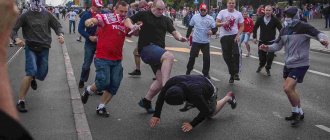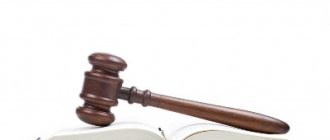One of the types of crimes provided for by the Criminal Code of the Russian Federation is refusal to provide assistance to a patient without good reason. This is an act provided for in Art. 124 of the Criminal Code of the Russian Federation, concerns those situations where a doctor or a person equivalent to him refused to perform his duties - and, as a result, harm to health was caused at least of moderate severity.
Let's consider what exactly this type of criminal act is, and what to do if you had to deal with it in practice.
What kind of offense is this?
Failure to provide assistance means the following: the person acting as the subject of this crime did not take the necessary actions aimed at improving the patient’s condition, resulting in harm to health.
When dealing with this type of crime, the following points must be taken into account:
- Only a medical professional obliged by law to provide assistance to the sick or injured can act as a criminal. In some cases, other persons may be held liable, but only when they are required by law to provide medical care.
- A health worker can be held accountable under this article only if providing assistance is part of his duties.
In particular, Art. 124 of the Criminal Code of the Russian Federation does not apply to the actions of orderlies, laboratory assistants, receptionists and other auxiliary medical personnel who do not have the necessary qualifications to help patients. Moreover, a doctor can avoid liability if the required actions do not correspond to his qualifications (in particular, a therapist who did not provide surgical assistance cannot be held accountable). - The patient had to promptly seek help from a doctor - and the doctor in this situation was obliged to provide it. In particular, it will not be criminal for a doctor to refuse to go to a patient’s home if, according to the terms of the medical services provided, the doctor was not supposed to go.
The situation is somewhat controversial when a doctor refuses a patient on the grounds that he does not have a medical insurance policy.
According to the current legislation, emergency assistance in a condition that directly threatens a person’s life or health must be provided regardless of the presence or absence of medical insurance. However, further treatment will only be provided for a fee.
As for the statute of limitations, it is regulated by Art. 78 of the Criminal Code of the Russian Federation.
Based on its content and the amount of punishment provided for in Art. 124 of the Criminal Code of the Russian Federation, we can conclude that filing a statement regarding the commission of this type of crime is useless if:
- more than 2 years from the moment the patient’s health was harmed;
- more than 6 years, if the patient died due to failure to provide assistance.
Police officer as a subject of crime
In addition to medical workers, other persons may be held liable under this article. The required basis for this will be the obligation to provide medical care, enshrined in regulations.
So, in particular, Art. 27 Federal Law “On Police” No. 3-FZ of 2011 provides in paragraph 1, part 2, that any police officer must provide first aid to citizens who have suffered from criminal acts or accidents , as well as to those who are helpless or dangerous for life or health condition. This duty always applies, regardless of the place, time of day or position held by the police officer.
Important! Similar rules apply to some other services or organizations. For example, first medical aid is required to be provided by employees of the Ministry of Emergency Situations, customs officers (if harm to health was caused by the use of weapons, special equipment or service dogs in accordance with the law), etc.
Conclusion: Yes, the subject can be a police officer.
Judicial practice under Article 124 of the Criminal Code of the Russian Federation
Determination of the Constitutional Court of the Russian Federation dated April 20, 2017 N 835-O
1. In his complaint to the Constitutional Court of the Russian Federation, citizen S.V. Batskikh, convicted and serving a sentence for committing a crime, argues that the provisions of Articles 1, 5 - 8, 9 - 11, 14, 15, 17, 20, 21, 24, 25, 27, 29, 46, 47, 49 - 51 , 53, 57, 58, 61, 73 - 75, 79 - 81, 83, 85, 87 - 92, 124, 125, 152, 156, 157, 162 - 168, 170 - 174, 177 - 181, 190, 192 , 194, 202, 208, 212, 217 - 222, 227, 229, 234, 237, 244 - 247, 249, 251, 254, 259, 260, 270, 271, 278, 281, 282, 284, 285, 3 07 , 389.11 - 389.17, 389.19, 389.20, 389.22, 389.31, 389.34, 389.36, 397, 401.14 - 401.16, 412.9, 413, 415 and 418 Code of Criminal Procedure of the Russian Federation and chapters 21 - 24 of this Code, Article 124 of the Criminal Code of the Russian Federation, as well as paragraph 14 of the resolution of the Plenum of the Supreme Court of the Russian Federation dated March 5, 2004 N “On the application by courts of the norms of the Criminal Procedure Code of the Russian Federation” and paragraph 2 of the resolution of the Plenum of the Supreme Court of the Russian Federation dated June 27, 2013 N “On the application by courts of legislation regulating the grounds and procedure exemption from criminal liability" his rights guaranteed by Articles 2, 15, 18 - 20, 22 - 25, 41, 45 - 50, 52, 118, 120 and 123 of the Constitution of the Russian Federation were violated.
Appeal ruling of the Judicial Collegium for Criminal Cases of the Supreme Court of the Russian Federation dated 03/06/2019 N 85-APU19-1
convicted under Part 2 of Art. 124 of the Criminal Code of the Russian Federation for 2 years of suspended imprisonment with a probationary period of 2 years, with deprivation of the right to engage in medical activities related to childbirth for 2 years; Vasilyeva Tatyana Leonidovna, ... unconvicted,
Resolution of the Presidium of the Supreme Court of the Russian Federation dated May 26, 2021 N 174-P20
By the resolution of the senior investigator of the investigative department for the Trusovsky district of Astrakhan, the investigative department of the Investigative Committee of the Russian Federation for the Astrakhan region dated November 8, 2013, it was refused to initiate a criminal case against employees of the criminal investigation department of police department No. ... Regional Ministry of Internal Affairs of Russia for the city of Astrakhan and against employees special rapid response squad of the Ministry of Internal Affairs of Russia for the Astrakhan region for the absence of corpus delicti in the act under Art. Art. 285, 286 of the Criminal Code of the Russian Federation, according to the statements of Tyurin Yu.Yu. and Tyurina R.Yu. about unlawful actions of law enforcement officers. In initiating a criminal case against employees of the municipal health care unit of the City Clinical Hospital N... named after. Kirov was denied due to the absence of corpus delicti in their actions under Art. Art. 124, 125 of the Criminal Code of the Russian Federation.
Can a medical worker go unpunished?
There are no certain types of medical care that cannot be provided with impunity. However, in each specific case, it is necessary to take into account what exactly the doctor (or a person equivalent to him) could have done, what exactly was done (or not done) - and what specific consequences occurred.
Interpretation of Art. 124 of the Criminal Code of the Russian Federation
In order for the actions of the perpetrator to be considered criminal, the following is required:
- The person was obliged to provide assistance.
- No help was provided, and there were no valid reasons.
- The result was dire consequences.
- There is a causal relationship between the inaction of the responsible person and the consequences.
Good reasons
In some cases, doctors' inaction will not be criminal. Each case is individual, and when considering the case, all significant factors must be taken into account, however, some typical situations can be identified when it comes to punishment under Art. 124 of the Criminal Code of the Russian Federation will not apply:
- External reasons. For example, if the ambulance was unable to arrive because the streets were flooded, this would relieve its employees from liability.
- Intervention by outsiders obstructing the provision of assistance. The classic case here is the situation with “HIV dissidents” or “refuseniks” who obstruct medical procedures on their children - and they end up dying.
- An urgent need. For example, if there is only one surgeon working in a medical institution, and two patients require urgent surgery at once, the doctor will not be responsible for the fact that one of them’s condition worsened or died due to delay. However, here it is necessary that the doctor first assess the condition of both and make an informed choice as to who should be given first aid.
- Lack of funds to provide assistance. For example, if the hospital physically does not have the required drug, the doctor will not be responsible for failing to administer it. Here we can only talk about the responsibility of the official whose duties included providing everything necessary.
- Incompetence of a doctor for a specific disease. However, you need to remember: the basics of first aid are included in the base of medical education, and all doctors, regardless of their specialty, should be able to provide it. If a doctor, incompetent in this matter, provided emergency assistance and called the necessary specialist, but he did not have time to arrive on time, there will be no talk of criminal liability.
Important! The list is indicative only. The court will ultimately decide which reason is considered valid.
Riots in Satpaev
On July 23 at 21:00, a resident of Zhezkazgan contacted the police in the city of Satpayev and reported his 5-year-old daughter missing. All personnel of the city police department and volunteers took part in her search. The girl was found in one of the apartments of a multi-storey building.
A huge crowd gathered in front of the house where the child was found. To get a rape suspect past an angry crowd, police had to dress him in their uniform.
According to eyewitnesses, the house and the exit from the entrance where the kidnapper lives were blocked. The crowd was growing every minute. At that time, about a thousand people had already gathered around. Rocks were thrown at the suspect's windows. Then people proceeded to the local police and city akimat building. Not believing in justice, they demanded that the suspect be handed over for execution.
During the march, people threw Molotov cocktails at several cars near the local police building. The riots in Satpayev lasted all night. National Guard forces were brought to the scene to stop them. The city authorities called on everyone to go home and not give in to provocations.
At what point is the crime completed?
Since the composition of Art. 124 of the Criminal Code of the Russian Federation provides for harm to the patient’s health (Part 1) or death (Part 2), then this criminal act will be considered completed from the moment these consequences occur. If for some reason the consequences were avoided (for example, instead of an inactive person, another specialist will provide medical care), there is no need to talk about the completed crime.
Here we can talk:
- About an attempted crime - if the person obliged to provide assistance deliberately evaded, and the consequences did not occur for reasons beyond his control.
- About the complete absence of a crime - for example, if a police officer or rescuer from the Ministry of Emergency Situations handed over the victim to ambulance doctors, without even providing emergency support.
Corpus delicti
This type of action is characterized by the following:
- Subject - only persons obligated by regulations to provide medical care in established cases. An ordinary citizen cannot be held liable under this article.
- The subjective side is both direct (the culprit knew what the refusal of help would lead to and wanted such consequences to occur) and indirect (the culprit did not want the consequences, but could and was obliged to foresee them) intent.
- Object – human health, or his life (Part 2 of this article).
- The objective side is inaction, that is, the lack of assistance that the culprit should have provided, the onset of serious consequences (harm to health of a certain degree or even death). In addition, a causal relationship between these two factors is required.
Important! The objective side will be only inaction. If assistance was provided, but of inadequate quality, it will be a completely different composition, provided for in Art. 109 or art. 118 of the Criminal Code of the Russian Federation.
Responsibility
The punishment under this article is as follows:
- If moderate harm was caused .
- a fine of no more than 40 thousand rubles or 3 months’ income;
- compulsory work up to 360 hours;
- repair work up to a year;
- arrest up to 4 months.
- If the harm is serious or death occurs.
- forced labor for up to 4 years (with or without deprivation of the right to professional activity for up to 3 years);
- imprisonment for up to 4 years (with or without the same additional punishment).
Parole for Pavlodar repeat offender
At the beginning of June 2016, a video appeared on social networks of an adult man in Pavlodar forcefully grabbing a five-year-old girl and, despite resistance, dragging her into the entrance of a nearby house.
The police detained Vladislav Chernetsov , who shortly before the tragedy was released from prison, having previously been convicted three times for raping minor girls.
He first abused a child in 1993. Investigators were able to prove only this fact, although they did not rule out that even then it was not the only one. The man was sentenced to 5 years in prison. But he served exactly half of his sentence.
In 1998, another case of rape of a schoolgirl was proven. The criminal went to prison for 10 years, but was again released on parole, having served only 7 years.
In 2005, after another arrest for a similar crime, Chernetsov was sentenced to 12 years in prison. But he did not serve this term completely, having again been released on parole.
Police note that the anger of city residents knew no bounds. To prevent attempts at lynching the accused during interrogations at the scene of the crime, they had to increase the number of escorts, and during the investigation the criminal was placed in solitary confinement, otherwise he would not have lived to see trial in prison.
What to do and where to go if left in danger?
If you had to deal with the criminal inaction of doctors, then the application should be submitted:
- To the administration of the institution where no assistance was provided.
- To an insurance organization that provides medical insurance services (for civil liability).
- Contact the police if significant health consequences have already occurred.
- To the prosecutor's office - if it is necessary to check the actions of doctors and, if necessary, initiate a criminal case.
Legal settlement
The claim is filed in the district court at the location of the medical institution where assistance was not provided.
The following may be used as evidence:
- Medical documents (medical histories, certificates, medical records, etc.).
- Testimony of witnesses.
- Conclusions of medical examinations.
When filing a claim, you must pay a state fee. Its size will depend on the claims and is determined in accordance with Art. 333.36 Tax Code of the Russian Federation. If the claim is of a non-property nature, then a fee of 300 rubles is paid.
It should also be taken into account that if a case was initiated under Art. 124 of the Criminal Code of the Russian Federation, then no duty will be paid, since we are talking about compensation for damage from a crime. In this case, the rules for drawing up a claim will be regulated by the rules of procedural law.
What can be used as evidence?
The following may be used as evidence in cases of this kind:
- Medical documents. These include medical histories, conclusions of medical commissions, examination data, etc.
- Testimony of witnesses who will confirm that there was a fact of applying for medical care - but it was not provided.
- Examination results.
- Other evidence relevant to the case. Procedural evidence does not define the exact list of evidence that can be used - and therefore the court can consider any facts relevant to the case.
Claim for moral damages
As in any other crime, the plaintiff may seek compensation for moral damages. However, the legislation does not determine exactly how it should be calculated. However, you need to prepare for the fact that the court will be skeptical about the evidence presented - and therefore it is possible to reduce the amount recovered or refuse compensation. Each case here is individual.
Conducted a preventive conversation, registered and released
On July 13, 2022, several groups on the social network Instagram reported an attempt to take a 5-year-old child to the store. Thus, one of the users in the kris.p.online group warned that a pedophile was operating in his yard in the Turksib district, who was allegedly at large, despite statements from his parents.
“A neighbor saw a suspicious man on the site smiling at the children, and later heard him inviting one of the boys to go to the store. This seemed suspicious to her, and she followed them. The man, seeing the neighbor, asked the boy to hide in the bushes and wait for him there. He was caught on a CCTV camera. The boy's parents filed a statement with the police, the man was found and detained. Today he was already released and the case was closed. They say they conducted a preventative conversation and registered him,” says a message distributed on social networks.
However, the police reported that a local resident born in 1961 claims that he simply wanted to buy water for his child.








